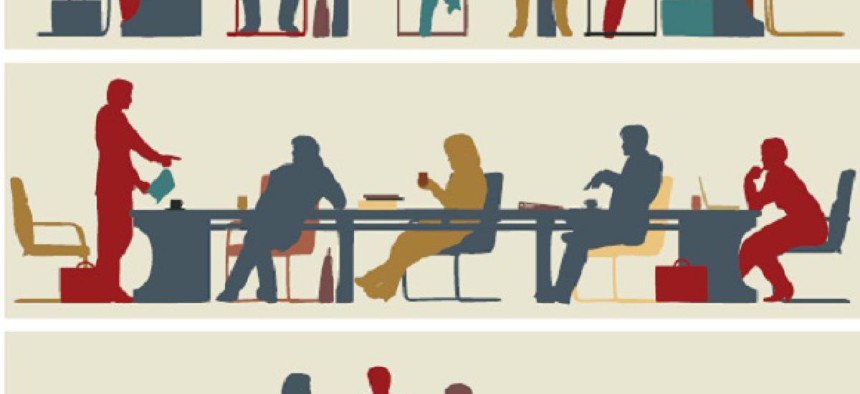
Image via Robert Adrian Hillman/Shutterstock.com
Run Better Meetings With This Four Letter Word
The OARRs principle is simple tool that makes any meeting more efficient.
Dave Barry, humorist and sometimes blogger for our sister site National Journal, put it best: "If you had to identify, in one word, the reason why the human race has not achieved, and never will achieve, its full potential, that word would be 'meetings.'"
Though universally hated, few have solutions for turning these gatherings into productive uses of time. Here at Excellence in Government, we recognize that a significant part of our days are spent in meetings. As a result, we've sought out some tools that can help turn the tide against fruitless meetings.
We begin with the problem: most meetings lack preparation and guidelines. Without structure, meetings run off the rails and quickly lose value for those in the room--turning from an exchange of ideas into a torturous exercise in sleep deprivation.
The OARRs principle is a simple tool that gives meetings structure--an easy to follow model for efficient and effective meetings. The acronym stands for:
O - Outcomes
A - Agenda
R - Roles
R - Rules
Outcomes
It's shocking how few meetings have a point in mind. To take from Barry again, meetings are like funerals: A gathering of people in uncomfortable clothes who'd rather be somewhere else--the major difference being "that most funerals have a definite purpose."
Before you facilitate any meeting, make sure that you have written down the meetings intended outcomes. In other words, when you leave the meeting, what will you have achieved?
Agenda
Every. single. meeting. should have a prepared, typed agenda. On it, you should include:
- The meetings outcomes
- The topics for discussion (and the amount of time allotted to each)
- Name of timekeeper
- Name of facilitator
- Established rules
- Start time
- End time
End time is important. Stick to it--respect people's time by always ending when you say you will.
Roles
Every meeting should have someone responsible for facilitating and another for keeping time. The meeting facilitator is tasked with keeping the meeting moving, on topic and that no single person dominates the discussion. Use a new facilitator each week as a staff development opportunity--offer them training and resources on how to facilitate successfully.
The timekeeper makes sure that meetings begin on time, that each topic stays within its allotted time and that the meeting concludes by the agreed upon end time. The timekeeper might be the most important, and most overlooked, role in running an efficient meeting.
Rules
Most meetings are lawless places reminiscent of the Wild West. There should always be ground rules for each meeting--say them out loud if it helps. Some good rules include:
- No laptops (unless needed)
- Cell phones off--or on vibrate
- No looking at cellphones during meetings
- An issues parking lot (where you can write down items to include for future meetings)
- An agreement that you start and end on time
- That one-on-one conversations occur "offline" (i.e. after the meeting)
What are meeting facilitation techniques you've found effective?
(Image via Robert Adrian Hillman/Shutterstock.com)







